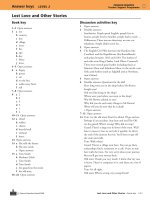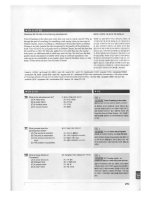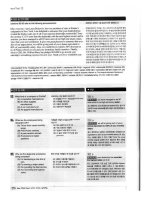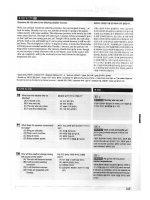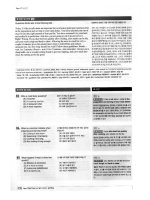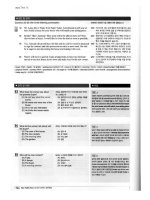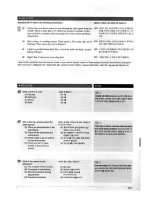Business result intermediate answer keys
Bạn đang xem bản rút gọn của tài liệu. Xem và tải ngay bản đầy đủ của tài liệu tại đây (317.42 KB, 49 trang )
Business Result Intermediate
Student’s Book Answer Key
1
Working life
Working with words
1
Possible answers
positive: glamorous, varied tasks, regular exercise, never dull, the views
negative: uncomfortable conditions, demanding schedule, routine tasks (maintenance /
safety checks), lonely, stressful
2
1
2
Ingrid is an NGO worker.
(NGO stands for Non-Governmental Organization and is an organization that is not
run by any government, but which may receive funding for certain projects from a
government’s development fund.) Mansour is an air traffic controller.
Ingrid likes her work because she sees results and has a sense of achievement. She
dislikes it because the bureaucracy and corruption can be depressing. Mansour likes
his work because it’s challenging and rewarding. He dislikes it because it can be
exhausting.
3
Possible answers
Ingrid is helping people in need, so this is similar to being a doctor in some ways.
Mansour’s job isn’t really like being a pilot, although he works with them.
4
1 worthwhile
2 dull
3 demanding
4 challenging
5 fun
6 glamorous
7 routine
8 depressing
9 varied
10 stressful
11 rewarding
Business communication skills
2
The second listening is more formal for the following reasons: the speakers use titles (Mr, Dr);
they use more formal phrases, such as I’m delighted to meet you.
© Oxford University Press 2008
3
Luc Akele: area manager, in charge of sub-Saharan Africa operations, oversees projects and
makes sure money is well spent, reports to main sponsors.
Jo Johansson: deals with fund applications.
Walter Mayer: responsible for medical donations programme, handles inter-government
work.
4
1 e, h
2 a, b, g
3 c, d, f
Phrases c, d, and g are slightly more formal. Phrase f is appropriate in both formal and
informal situations.
5
1 deal with
2 in charge of
3 oversee
4 responsible for
5 handle
6 involves
Practically speaking
1
Phrase 4 isn’t a response to show interest - it is generally used to get more information about
the other person.
3
1 A recruitment consultant?
2 That sounds …
3 So tell me, …
4 Oh, right.
5 Really?
Language at work
1
Suggested answers
works – a general fact
focus – a general truth about the organization’s activity
visit – an action often repeated (used with an adverb of frequency)
2
1
2
3
4
Sentence b. Sentence d can also be answered yes / no, although 2 is more likely.
Sentences a, c, and d.
Sentence d is indirect. Check students realize that the verb moves to the end
because of the phrase Can I ask …? Ask students for other similar expressions: I’d
like to know …, Could you tell me …?, I was wondering … .
Sentences c and d don’t use an auxiliary verb. This is because they are questions
where the answer is the subject of the question.
© Oxford University Press 2008
5
0%
Never
100%
rarely
occasionally
sometimes
often
usually
always
6
1 occasionally 2 always
3 rarely
4 sometimes
5 rarely
Case study
Discussion
1
Possible answer
Networking is important for companies as it enables them to establish connections with
individuals and other companies, who might become clients or partners. It is also important
for individuals, as it may help them progress in their careers.
2
Possible answers
advantages: a fast and efficient form of business networking, a good way to get results, it
also sounds fun and means you meet a lot of different people at one event.
disadvantages: it costs money to attend, you may not have enough time to decide whether
someone is a useful contact, it could be seen as an unnatural way of meeting people.
3
Possible answers
In theory, international speed networking could work via videoconferencing or webcams in
order to avoid the problems of travel. Alternatively, it could be combined as part of a
conference event over a few days.
© Oxford University Press 2008
2
Projects
Working with words
1
1
2
•
•
•
•
Volunteerism is a movement within some businesses to encourage staff to offer some
of their time and skills for free to help a good cause.
Employees in the reading have worked on
community and social projects
conservation, teaching, caring, or building
building an extension to a school
redecorating a community centre.
•
•
•
•
•
As well as benefiting the people who receive the help from volunteers, such as the
local community, the volunteers themselves also benefit in the following ways:
gain new skills
improve teamwork
gain new ideas and insights
learn from the experience of others
learn how to organize a project.
4
Samira has learnt how to organize a schedule and how to deal with a budget.
3
2
1 objectives
2 update
3 schedule
4 deadline
5 budget
6 skills
7 resources
8 teamwork
3
1&2
deadline - the end of the week schedule - they are behind schedule because of the
holiday
resources - at first it was hard to know how to allocate these
budget - she has stayed within it
teamwork - it’s essential
update - she receives updates every two days
2
1 meet
2 behind
3 up
4 on
5 ahead of
6 allocate
© Oxford University Press 2008
7 within
8 delegate
9 on with
10 get
3
Possible advice for the colleague
meet all the deadlines
don’t fall behind schedule - if you do, try to catch up and even finish ahead of
schedule
find out what resources you have and allocate them to your team members
always stay within the budget
make sure your team members get on with their jobs
ask for regular updates from each person in order to maintain control
make sure everything is on track
•
•
•
•
•
•
•
Business communication skills
1
decorating - still painting the ceiling, needs another day or so
lighting - it’s finished
carpets - still waiting, need to call suppliers
action - meet team to allocate tasks for final stages
2
1 are things going
2 so good
3 back on track
4 happening with
5 still painting
6 are we with
7 finished that
8 to recap
9 to plan
b 2, 3, 5, 7
c 8, 9
2 Josie and Samira
3 Josie and Samira
5O
6D
9D
10 S
3
a 1, 4, 6
5
1 Bruno
6
1A
2A
3O
4O
Practically speaking
1
1
2
a
c
e
f
b
d
I’m returning your call.
It’s (name) here.
What can I do for you?
I’m calling about / for / to …
Thanks for your help.
Thanks for calling.
© Oxford University Press 2008
7O
8A
Language at work
1
Sentence 1 uses the present continuous because it describes an action at the moment of
speaking.
Sentence 2 uses the present simple because it describes a repeated or regular action.
2
Both questions refer to ‘now’ or time ‘around now’, rather than ‘in general’. However, question
1 uses the present continuous because it refers to a current or temporary action taking place
at, or around the time of speaking. Question 2 also refers to a moment at the time of
speaking, however, the verb need is a state verb. State verbs are not normally used in the
present continuous form. If students are having problems with this, then the rule completion in
3 will help.
3
1 simple
2 continuous
3 continuous
2 is fixing
3 knows
4
1 is he doing
4 repairs
5
1 What are you working on this week?
2 Do you like travelling?
3 How often do you work late?
4 Are you having any problems at work at the moment?
5 Who are you talking to right now?
6 How many people are in your English class today?
7 What are you thinking at the moment?
8 Do you understand the word ‘deadline’?
Case study
Discussion
3
1
2
unfriendly: large amounts of energy, uses a lot of water, wastes glass and plastic,
new furnishings.
friendly: energy-generating dance floor, low-energy lighting, rain water used in
toilets.
© Oxford University Press 2008
3
Leisure time
Starting point
Possible answers
1
2
3
Work-life balance is the balance between the time a person spends on work and on
leisure.
If employees are not expected to work long hours, this might actually improve
productivity. Employees could be more motivated and less tired. If employees are
less stressed and have fulfilling lives outside work, they might also be less likely to
take time off sick or leave the company.
Answers will vary. Note that there could also be rules or laws relating to working
hours in their countries.
Working with words
1
1
2
3
In his old job Todd worked fifteen-hour days. In his new job he usually finishes by
5.10 p.m. Students can comment on the hours they work.
Todd tells his employees to go home by 5.10 p.m. and not to work at the weekend or
take work home.
Students comment on their own workplace.
3
Possible answers (with relevant quotes from listening)
Nina (Student A)
Statement 2 (Score = 1) I got home at midnight … Statement 7 (Score = 0) I’ve still got five
days holiday left from last year …
Florin (Student B)
Statement 5 (Score = 2) Did you go out again last night?
Statement 6 (Score = 1) … this Saturday … I’ll join him and the sales team from Kyoto for
golf.
Statement 7 (Score = 2) I used it (holiday) all for my walking tour in Morocco.
Florin appears to have a slightly better work-life balance than Nina because he manages to
take his holiday and he has free time to watch TV. Nina has to work late and has difficulty
finding time for leisure.
© Oxford University Press 2008
4
1 do
2 take
3 work
4 make
8
1 tired
2 excited
3 boring
Having completed this, students should be able to answer the question as follows:
The -ed form describes how a person feels.
Business communication skills
1
Department in week 1: human resources
Department in week 2: marketing
Travel to: Copenhagen
Weekend plans: go to the country with Kris
Need to buy: a few things for the room
2
Questions
1 Do you like
2 Is this
3 What sort of
4 How is
5 How do you find
Mirella’s responses
Yes, it’s great.
Yes, it’s my first time out of Brazil.
Walking around the city.
It’s fine.
… the family has been very nice.
4
1 ’s interested in
2 ’s fond of
3 isn’t crazy about
4 isn’t keen on
6
Extension no: 351
Press 9 for an outside line.
Company no.: 00 46 096 745 6745
Email:
Mirella checks her spelling by clarifying it with names of everyday objects (S for sugar, E for
egg).
Practically speaking
2
Anyway, I’d better get on.
I need to go now, I’m afraid.
I should get back to work.
Possible context for the other phrase: I’ll get back to him in a minute = referring to calling
someone back.
© Oxford University Press 2008
3
Yes, me too.
Thanks for your help.
Thanks for calling.
Language at work
1
Possible questions
How was your holiday? Did you enjoy the conference?
Have you ever been to Spain? Have you ever been to Japan?
2
How was you weekend? Good thanks.
Did you go to the gallery on Saturday? Yes, I did. It was fascinating.
Have you ever been there? Yes, a couple of times.
Have you met Mirella? No, I haven’t.
3
1 F (I’ve only just arrived.)
2 T (Yes, I did.)
3 F (Have you ever been there? Yes, a couple of times.)
4 T (Have you met Mirella? No, I haven’t.)
5 T (I’ve just organized a desk for you …)
6 F (Leif played tennis at the weekend.)
7 T* (I haven’t played for ages.) *We don’t know the exact date.
4
1c
2d
3a
4b
5
I haven’t played tennis for ages. = for + a period
I haven’t seen you since January. = since + a specific time
6
1
2
3
4
5
6
7
8
booked
Have you ever been Note: it could be Did you go if the speaker knows that it had
been planned at one stage, but is unsure if the trip happened in the end.
lived
haven’t seen
changed
Did you go
for
since
© Oxford University Press 2008
4
Services and systems
Working with words
1
1
2
The first (a) is about The Guardian (a newspaper).
The second (b) is about Lloyds TSB (a bank).
The third (c) is about Expedia.com (an online travel agency).
Answers will vary.
2
Speaker 1: website c (travel)
Speaker 2: website b (banking)
Speaker 3: website a (information search / online news)
3
Possible answers
user-friendly, up-to-date, accurate, immediate, convenient, secure, time-saving, efficient, costeffective
5
1 & 2 First person: courier service – deliver orders on time, maintain excellent relationships
with customers.
Second person: mobile phone news update service – he always knows what’s happening,
easier to make decisions.
Third person: online shopping – it’s faster and always open, helps to manage time.
Fourth person: crèche – lets her work full-time and still have time with her child in the middle
of the day.
Business communication skills
2
1
2
3
4
5
It was slow.
In a few weeks.
It looks similar to the old database, but the bottom half is different.
It suggests room types and availability. You can type in notes about customers.
Drop-down menus help match the customer to the room.
It won’t work as well without detailed information from the customer (who might be
unwilling to give this).
3
1c
2e
3a
4h
© Oxford University Press 2008
5b
6f
7d
8g
4
a 1c, 2e, 3a, 6f, 7d, 8g
b 4h, 5b
5
Possible answers
2
3
4
5
6
As soon as you press this button, it starts to look for the customer’s name.
It looks very similar to the old system, but what’s different is the quantity of
information it can store.
So, as well as storing basic information, it also finds more information.
The more the information you get, the easier it is to target customers.
One downside is that the system is more complicated, but on the plus side it is faster.
6
Possible answers
Files on PCs compared with filing cabinets
Benefits
Drawbacks
less space
often still need hard copies
less paper
files easily deleted by accident
less time needed for filing
computer files can be easily
copied / stolen
easily updated
Online banking compared with going into a bank
Drawbacks
Benefits
can’t solve problems or
faster
answer queries immediately
lacks ‘personal touch’
more convenient
always open
could be less secure
cheaper for bank
Practically speaking
2
a3
b5
c1
d2
Language at work
1
1 longer
2 easier
3 slow
4 more positive
© Oxford University Press 2008
5 better
e4
2
1 no improvement (takes a little longer to learn how to use)
2 small improvement (slightly easier to find)
3 big improvement (definitely not as slow)
4 big improvement (they are far more positive)
5 big improvement (it’s a great deal better)
3
1 much noisier (not more)
2 not as dark as (not darker)
3 bigger (not biger)
4 much more convenient (not convenienter)
5 much worse (not much more worse)
6 as good as (not as good than)
7 than me (not that me)
4
slightly (S), a great deal (B), nearly as … as (S), not anything like as … as (B), a little (S),
significantly (B), far more (B), much less (B), marginally (S), not nearly as … as (B), a lot (B)
Case study
Discussion
1
Possible responses
1
2
3
As well as receiving financial incentives for not driving to work, employees also
benefit by not having the stress of driving to work. On the bus they can relax and
read, or they can get fit and healthy by cycling to work. As the company also pays
72% of bus and rail passes they save money.
The company benefits by saving money on parking facilities and by being seen as
environmentally friendly.
The local community benefits by having fewer cars on the road, therefore having less
congestion and pollution.
2
Possible answers
Some more ways to reduce the number of cars even further could be to:
•
penalize car drivers (they have to pay to park)
•
provide buses to pick workers up
•
provide information about which employees live near each other, so that drivers can
pick each other up
•
implement more ways for staff to work from home, so that on some days they don’t
need to travel in to work.
© Oxford University Press 2008
5
Customers
Starting point
Possible answers
external customers: visitors to a shop, trade customers, online customers.
internal customers: contact in sales office in Hong Kong, boss, receptionist, warehouse
manager.
Working with words
1
Technogym produces fitness and biomedical rehabilitation equipment.
The customers mentioned are the fitness centres, private homes, and the Olympics.
2
1 services
2 satisfaction
3 care
4 expectations
5 requirements
3
13
22
31
45
54
4
1 services
2 satisfaction
3 supply
4 care
5 expectation(s)
6 requirement(s)
7 production
5
1 expect
2 supply
3 services
4 satisfied
5 expectations / requirements
6 expectations / requirements
7 services / care
8 service
9 cares
10 products
6
1 require
2 assess
© Oxford University Press 2008
3 monitors
4 ensure
5 provide
6 tailor
Business communication skills
1
1 Type of hotels
2 Age of current facilities
3 Number of hotels
4 Budget
2
1 find out about
2 tell me
3 interested in
4 deal with
5 possible for
4
1 a meeting
2 the start of Sergio’s trip
3 Elena and Sergio’s meeting
5
1 arrange
2 How
3 ‘d prefer
4 suits
7
1 to change the time of their appointment
2 work in general and the weather
3 Wednesday
4 the appointment (to Thursday)
8
26th: Meeting at 9.30 a.m.
28th: Tour at 3.00 p.m.
Practically speaking
1
1e
2c
3a
4b
5 ‘m calling
4 begins
Language at work
1
1 ‘re coming
2 comment
2
1 and 4
© Oxford University Press 2008
5d
3
a1
b4
4
1 continuous
2 simple
5
1 ’m writing
2 are meeting
3 arrives
4 is coming
Case study
Discussion
1
Possible answers
Customers would expect a peaceful location, excellent food, and personalized service. The
reviews suggest that customers don’t receive expected levels of service and food quality.
2
Possible answers
Most students will probably agree that it is important to act on customer feedback and to see
it in a positive way since it can help a business to improve. Many businesses are very
customer-driven and rely on feedback to help them to be customer-focused. For hotels,
negative online feedback can now really affect business, since many potential guests tend to
search for online reviews. However, it is also worth noting that the negative feedback for
Limewood Spa may be isolated cases. In this case the hotel might need to look into the
issues before reacting too quickly to a couple of negative comments.
3
Possible answers
The feedback suggests that staff at Limewood Spa need training in customer service, as they
all criticize employees. The food at the restaurant also receives poor feedback.
© Oxford University Press 2008
6
Guests and visitors
Working with words
1
1
2
Overall, business travellers seem to be more positive than negative about business
travel, with 78% saying they enjoy it, although many business travellers also point out
the obvious drawbacks of being away from home (55% say it affects their personal
life).
Answers will vary.
2
Traveller 1
Traveller 2
Reason for
visit
research trip (to find
somewhere for a conference)
a trade exhibition
Where they
are staying
The Patio Hotel
Hotel Dona Maria
- find out about
Plans
(professional / venues and
entertainment
personal)
- excursion to
Cordoba
- try some local
specialities
- do some shopping /
buy souvenirs
- meet colleagues
- look round the
old town
- have a meal
3
1 sightseeing
2 conference
3 venue
4 facilities
5 hospitality
6 speciality
7 nightlife
8 exhibition
9 excursion
10 entertainment
5
a meet up with
b check in
c freshen up
© Oxford University Press 2008
d pick (someone up)
e drop (someone) off
f show (someone) around
g eat out
h look around
Business communication skills
2
Morning: tour of facility with Aruna Singh.
Lunchtime: meet Jacinta and Dilip Patel for lunch.
Afternoon: meet the team.
3
1 Welcome to
2 finally meet you
3 your journey
4 any trouble
5 let me take
6 get you
7 run through
8 thought you could
9 we’ll catch up again
10 you’ll get a chance
11 Make sure
12 don’t worry about
4
a2
b1
c7/8 d7/8 e6
f5
g4
h3
7
1 Head of Public Relations
2 a guided tour in the morning and then a chance to meet the engineers over lunch
3 stay with Aruna at all times for their safety
8
1 On behalf of … it gives me great pleasure to welcome you to …
2 You will have the opportunity to …
3 Can I remind you that …
4 Please be sure to …
Practically speaking
1
Suggested answers
Would you like a drink? is clearly the most formal and polite.
Do you want a drink? sounds quite informal and could almost be considered impolite in
certain contexts.
Do you fancy a drink? is also less formal but would be acceptable in many contexts.
Can I get you a drink? is fairly neutral and can be used safely in most situations.
2
1 fine
2 would
© Oxford University Press 2008
3 please
4 sounds
5 love
6 time
Language at work
1
1
2
3
it is where they assemble the units
dust
a clothing must be made from synthetic materials (no wool or cotton because natural
fibres produce particles)
b no jewellery can be worn
2
necessary
room is dust-free, special overalls (bunny suits), clothes made of synthetic materials, helmet
and air filter mask, strict procedure for putting on bunny suits
not necessary
getting undressed
against the rules
clothes made of natural fibres, wearing jewellery or watches
3
1e
2 a, g
3 c, d
4h
5b
6f
Case study
Discussion
1
Possible answers
Problems
• project is behind schedule
• relationships between managers and teams is getting worse
• meetings are long and outcomes are unclear
• communication problems
• different attitudes
Reasons
From the reading we should understand that there isn’t a problem with the standard of work,
so the issues must be due to cultural differences. For example, one side is taking longer to
arrive at final decisions and the end conclusions are not being defined. There is clearly a
language problem - this is probably due to different accents and maybe some differences in
their ‘Englishes’. It is possible that the Indians have a more relaxed attitude to time and
deadlines, whereas the Swedes are not being direct enough in their use of language.
© Oxford University Press 2008
2
Possible answer
AKA could provide intercultural training to both sides. This would raise awareness of the
cultural differences between the two nationalities and would encourage the people involved to
see situations from the other culture’s perspective. This should lead to a better working
relationship.
3
Possible answers
•
•
•
•
find out as much as possible about the country’s culture
attend intercultural training courses
learn the local language
speak to other people who have relocated to that country and find out about their
experiences
© Oxford University Press 2008
7
Security
Working with words
1
1
2
3
In the first reading the security breach was theft of information from databases as a
result of unauthorized access. In the second, the employee stole in full view of
security cameras.
Personal information was stolen in the first case; DVDs and CDs were stolen in the
second case.
A credit agency and its customers in the first case; the company where the thief was
employed in the second case.
2
Security measures
password
security pass
security cameras
security staff
monitor
Security breaches
unauthorized access
identify theft
stealing
entering a system without passwords
4
1 safeguard
2 deter
3 monitor
5
1 insure … against
2 prevent … from / stop … from
3 check … for / scan … for
4 prevent … from / stop … from / deter …from
5 safeguard against / protect against
6 check … for / monitor … for / scan … for
6
Possible answers
protects against worms and hackers (anti-virus software)
deters burglars from breaking in (CCTV)
stops someone from logging in to private data (password)
insures against unauthorized entry (security pass)
scans for illegal objects (X-ray machine)
safeguards against thieves (burglar alarm)
prevents someone from opening a lock (lock and key)
© Oxford University Press 2008
Business communication skills
1
Some possible answers
ID card
+ easy to make, easy to check by photo
– can be forged, easy to lose, must be checked by people
PIN number
+ very secure, can be changed quickly, can be combined with swipe card for extra security –
easy to forget, someone might steal it by watching
Key
+ cheap, small
– easy to lose, steal, or copy
2
1
2
current system is identity badges, new system is swipe cards
the advantage is that every person’s ID can be checked, the disadvantage is that
staff will have to swipe every time they go through a door
3
1f
2h
3e
4d
5b
6g
7l
8c
b 3, 4, 12
c 8, 10, 11
d 5, 7, 9
4
a 1, 2, 6
5
Student A notes
Current situation
– problems with underground car park
– employee’s bag stolen
Changes
– install CCTV in car park and corridors by the end of the month
– these are connected to screens in reception
Student B notes
Current situation
– problems with virus on the network
– hacker tried to read employee information
Changes
– install new software to scan computers
– start new system of passwords
– new password every month from department manager
© Oxford University Press 2008
9j
10 a
11 i
12 k
Practically speaking
2
1S
2S
3C
4C
5C
6S
7S
8S
Language at work
1a
2b
2
present perfect simple: b
present perfect continuous: a
3
1 ‘ve been working
2 ‘ve completed
3 met
4 ‘ve understood
2 reason
3 reason
4 reason
5
1 result
6
1 Consequently = so / therefore / as a result
2 In order that = so that
3 because of = due to
4 in order to = to
Case study
Discussion
1-3
Possible answers
1
2
3
The bad publicity for the security firm may mean that customers lose confidence in it
and take their business elsewhere.
The company could write a letter to all of its customers and assure them of the
security measures being used and any changes that are being made.
The company could – change its passwords more regularly – issue passwords to
fewer people.
© Oxford University Press 2008
Task
2
Possible answers
Advantages
Disadvantages
1
you could know about all the staff
very time consuming
2
limits information leaving
the building
we need employees to be
able to work from home
3
this would mean there are
fewer staff to check (in 1)
it might be inconvenient
to limit the numbers
4
limits information leaving
the building
USB devices are more
convenient than using laptops
5
makes sure everyone is aware of the
situation and requirements
time consuming
6
would improve morale and
stability
expensive and suggests
you can’t trust employees
7
the information is
centralized and controlled
impractical, inconvenient, and still
means data can be accessed
externally
8
will stop anyone without
the password
people always forget passwords
© Oxford University Press 2008
8
Working together
Starting point
John Lennon and Paul McCartney
They were the songwriting partnership in The Beatles and worked in the music industry.
Although they always signed their songs as Lennon and McCartney, they reportedly wrote
many of the later songs separately and took input from each other. They inspired each other
through the competitive nature of their partnership.
Domenico Dolce and Stefano Gabbana
Dolce and Gabbana is a famous Italian brand in the fashion industry which was set up by two
young designers.
Philips and Douwe Egberts
Philips makes electronic household goods and Douwe Egberts produces coffee. The two
companies have collaborated to produce coffee machines which use easy-to-use coffee
capsules.
Crédit Lyonnais and Tour de France
Crédit Lyonnais is a French bank which has sponsored the Tour de France cycling race for a
number of years. The famous yellow jersey worn by Tour de France champions also shows
the name Crédit Lyonnais.
Working with words
4
1 Disagree
2 Agree
3 Agree
4 Agree
5 Agree
6 Agree
5
take responsibility
team player
work closely
join forces
complementary skills
common ground
form alliances
joint venture
mutual benefit
shared goals
5 form alliances
6 work closely
7 joint venture
8 shared goals
9 team player
10 common ground
6
1 complementary skills
2 join forces
3 take responsibility
4 mutual benefit
Business communication skills
2
Nikos’s plan: hold a series of informal meetings for staff.
How it will work: people can meet informally and develop a relationship.
Timescale of plan: seven or eight meetings by the end of next month.
What he needs before he can launch it: a list of Buckler’s key people.
3
a big event which will be fun - Carmen wants ideas on this
© Oxford University Press 2008
4
1 expect
2 leave
3 Over
4 plan
5 take
6 intend
7 timescale
8 By
9 step
10 likely
11 term
12 chances
13 long
5
a 1, 4, 6, 10, 11, 12, 13
b 3, 5, 7, 8
c 2, 9
Practically speaking
1
1 a, c, d
2 b, e
Language at work
1
1
2
She is optimistic about the schedule and thinks that they should be in the new
premises by the end of June as planned.
She predicts that there could be trouble and some people will leave because of the
changes.
2
1 I’ll / will
2 could / might
3 going to
4 should
5 going to
6 ‘ll / will
c ll
d might / could
e going to
f going to
3
a should
b will
4
Possible answers
1 I’m going to finish on time.
2 She should be here in fifteen minutes.
3 We might not reach our targets if sales don’t improve.
4 I might apply for the job.
5 It’ll be there in two days.
Case study
Discussion
1-3
Possible answer
1 a group of people who work together, but who are located in different places and ‘meet’
using their PCs
© Oxford University Press 2008
